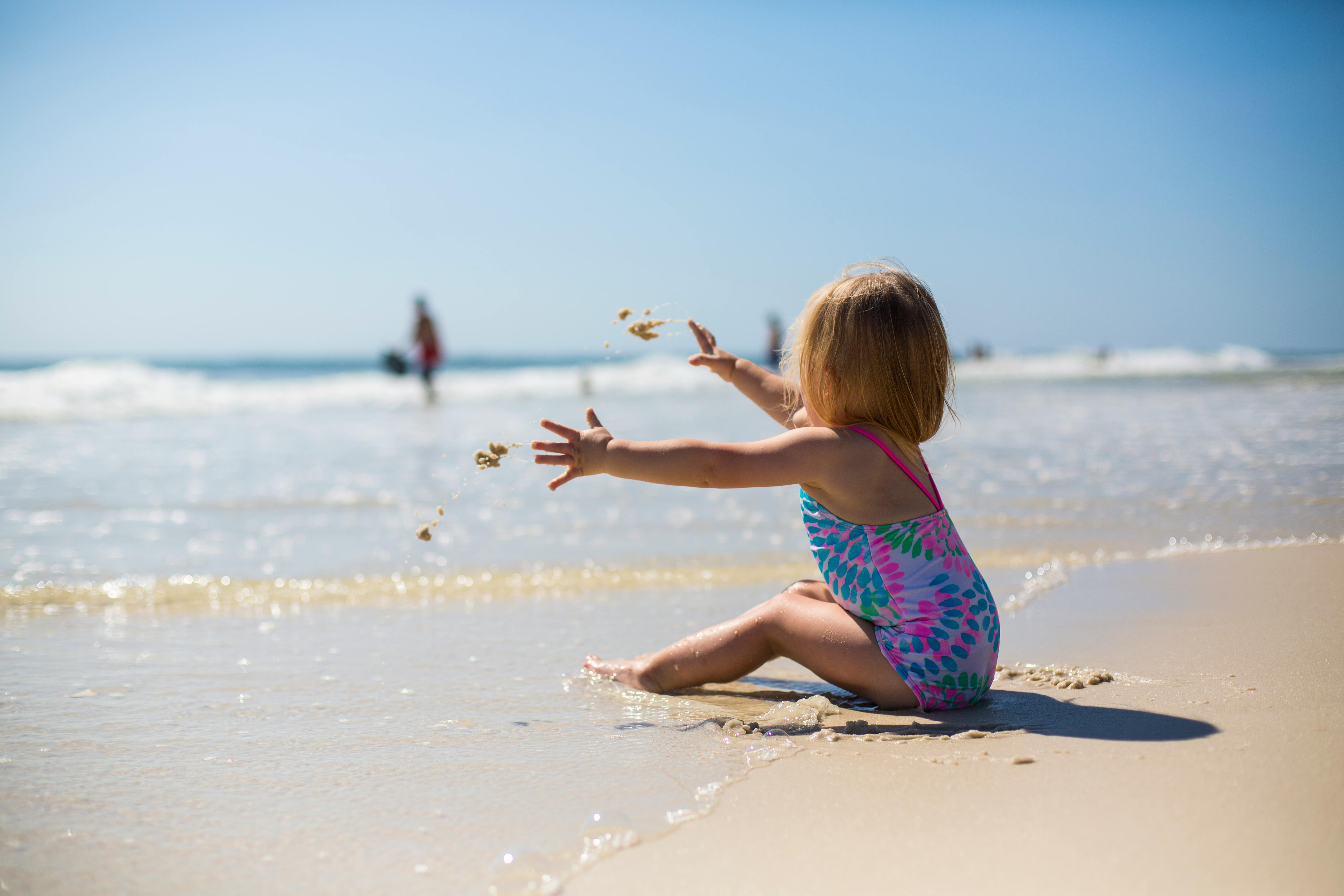Taking your baby to the beach can be a fun and exciting experience for both you and your little one. However, it is important to make sure that you are prepared for this trip so that your baby is safe and comfortable. Knowing when you can safely take your baby to the beach will help ensure that everyone enjoys their time in the sun.It is generally recommended that babies be at least 6 months old before taking them to the beach. This is because it takes time for babies’ immune systems to fully develop and they may be more susceptible to bacteria and water-borne illnesses when younger. Additionally, babies younger than 6 months may not yet have the neck strength to support their head while in the water.
Planning Ahead
Before taking your baby to the beach, it is important to plan ahead. You should consider the type of beach you want to visit, what time of day you want to go, and the safety precautions you need to take. You should also think about the activities you want your baby to participate in and what kind of equipment you will need for them. It is also important to plan for any emergency situations that may arise.
Clothing and Sun Protection
When visiting the beach with your baby, make sure they have appropriate clothing and sun protection. Lightweight clothing made from breathable fabrics is best for a hot day at the beach. Make sure to bring a sunhat, sunglasses, and sunscreen with SPF 30 or higher for your baby’s sensitive skin. Also bring extra clothes in case of spills or accidents.
Food and Drink
It is important to bring plenty of food and drinks when visiting the beach with your baby. Pack snacks such as granola bars, fruits, and vegetables that are easy for them to eat on-the-go. If you plan on staying at the beach all day, pack a lunch for yourself and your baby as well as extra bottles of water or juice boxes for hydration.
Beach Toys
Beach toys can make a trip to the beach fun for your little one! Pack buckets and shovels so they can build sandcastles or search for seashells in the sand. If there are waves at your chosen beach spot, consider bringing some floaties or an inflatable pool so your baby can splash around safely in shallow waters under adult supervision.
First Aid Kit
It is important to bring a first aid kit when visiting any beach with young children. The kit should include items such as bandages, antiseptic cream, pain relievers (for adults), antihistamines (for allergies), sunscreen (for reapplication), insect repellent (for bugs), tweezers (for splinters), saline solution (for eye irritations), thermometer (to check temperatures) and anti-diarrhea medicine (just in case). Having these items on hand will help ensure that everyone has an enjoyable trip!
Basic Safety Measures for Taking a Baby to the Beach
Taking your baby to the beach can be a wonderful experience for both you and your little one, but it’s important to take safety measures to ensure their safety. Here are some basic safety measures you should take when taking a baby to the beach:
Sun Safety: Babies are more susceptible than adults to sunburn and skin damage, so make sure your baby has ample sunscreen on, and is wearing protective clothing such as a hat and sunglasses. Reapply sunscreen every two hours and keep your baby in the shade as much as possible.
Water Safety: Always keep an eye on your baby while they are in or near water, even if they’re wearing a life jacket. It’s best not to allow them in deep water until they are old enough to swim on their own. If you do let them enter deeper water, stay close by and monitor them closely.
First Aid Kit: Keep a first aid kit handy in case of any cuts or scrapes that may occur during your beach trip. Include items such as bandages, antiseptic ointment, tweezers, cotton swabs, and thermometer in case of fever or dehydration.
Insect Repellent: Make sure your baby is protected from mosquitoes and other insects with insect repellent containing DEET or another safe insect repellent ingredient. Avoid using sprays directly on babies skin – instead spray onto clothes only.
Food & Drinks: When packing food for the beach trip, it’s important to remember that young babies’ digestive systems are still developing so avoid giving them foods that could trigger an allergic reaction such as peanuts or shellfish. Also make sure you bring plenty of water for everyone to stay hydrated throughout the day!
Safety Gear For Taking a Baby To The Beach
Taking a baby to the beach can be an enjoyable experience, but it’s important to remember that the beach can be a dangerous place for babies. Taking the right safety gear with you is essential for making sure your baby is safe and comfortable while at the beach. Here are some of the most important pieces of safety gear to take with you when taking a baby to the beach:
Sun Protection
The number one priority when taking a baby to the beach should be sun protection. Make sure to bring along hats, sunglasses and adequate clothing that covers their skin. It’s also important to apply plenty of sunscreen on any exposed skin, and make sure to reapply every couple of hours.
Swimming Gear
If your baby is old enough and you plan on swimming, it’s essential to bring along some swimming gear. Make sure your baby has an appropriate swimsuit or rash guard for protection against the sun as well as flotation devices such as life jackets (for older babies). It’s also a good idea to bring along some pool noodles or inner tubes so your baby can float in comfort.
First Aid Kit
No matter what precautions you take, accidents can still happen at the beach. That’s why it’s always smart to bring along a first aid kit filled with essentials such as bandages, gauze, antiseptic wipes and other items that may be needed in case of an emergency.
Insect Repellent
Insects can be especially bothersome at the beach, so make sure you bring along some insect repellent. Not only will this help keep bugs away from your baby, but it will also help protect them from any diseases they may carry.
By following these simple tips and bringing along all of the necessary safety gear when taking a baby to the beach, you can rest assured that your little one will have an enjoyable and safe time at the beach.
What Sunscreen Is Best For Babies At The Beach?
When it comes to protecting babies from the sun at the beach, it’s important to choose a sunscreen that is specifically designed for their delicate skin. When looking for a sunscreen for babies, opt for one that has an SPF of at least 30 and is formulated with physical UV blockers like zinc oxide and titanium dioxide. It’s also best to choose a sunscreen that is water-resistant and free of chemicals like oxybenzone and octinoxate, which can irritate baby’s skin.
When shopping for baby sunscreen, look for products that are fragrance-free, hypoallergenic, non-comedogenic (meaning they won’t clog pores), and dermatologist-tested. Be sure to apply the sunscreen generously 15 to 30 minutes before going outdoors and reapply every two hours or after swimming or sweating. To ensure your baby is properly protected from the sun’s harmful rays, dress them in lightweight clothing with a UPF (ultraviolet protection factor) rating of 50+ as well.
By taking these steps and choosing the right sunscreen for your baby, you can help ensure their safety while still allowing them to enjoy the beach.
Protecting Your Baby from the Sun
Taking your baby to the beach can be a wonderful experience, but it’s important to make sure they’re protected from the sun. Babies’ skin is much more delicate than adults, so it’s important to keep them out of direct sunlight and make sure they’re wearing sunscreen and protective clothing. Hats are also incredibly important for protecting their face, neck, and ears from the sun. You should also keep your baby hydrated with plenty of water or fruit juice.
Keeping Your Baby Cool
When temperatures get too high, you want to do everything you can to keep your baby cool. One way you can do this is by bringing a canopy or umbrella so your baby can stay in the shade while at the beach. Having a pool or some other body of water for your baby to play in can also help them cool off when it gets too hot. You should also bring plenty of extra clothes so you can change them if they get too hot and sweaty.
Avoiding Sand and Water Hazards
It’s important to be aware of any potential hazards when taking your baby to the beach. You should avoid letting them play in any deep water, as this could cause them to drown. You should also watch out for any sharp objects that may have been left on the beach, such as broken glass or shells. If you’re going into the ocean with your baby, make sure there are no strong currents that could carry them away from shore.
By taking these precautions, you can ensure that your baby has a safe and enjoyable time at the beach!

Conclusion
Going to the beach with a baby can be an enjoyable experience, but it’s important to take the necessary precautions. Make sure you have the right equipment, such as a beach tent, hats, and plenty of sunscreen. Additionally, be sure to bring enough food and water to keep your baby hydrated and nourished throughout the day. If your little one does not enjoy being in the direct sunlight, consider taking a stroll near the shore or playing in the sand. With proper planning and preparation, you can make your beach trip with your baby a safe and memorable one.
No matter how old your baby is, there are always risks associated with taking them to the beach. Be sure to stay alert and watch for any signs of distress or discomfort in your little one at all times. By following these tips and using common sense, you can ensure a fun and safe day at the beach with your little one.




